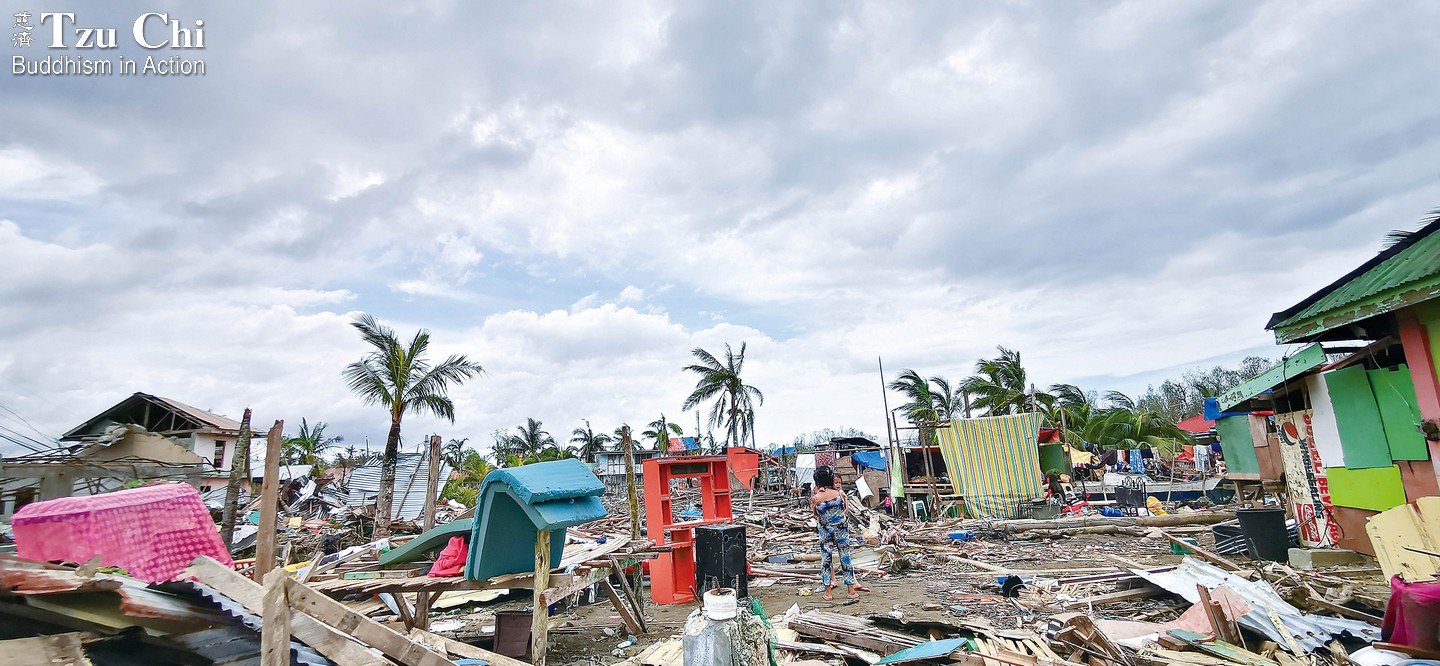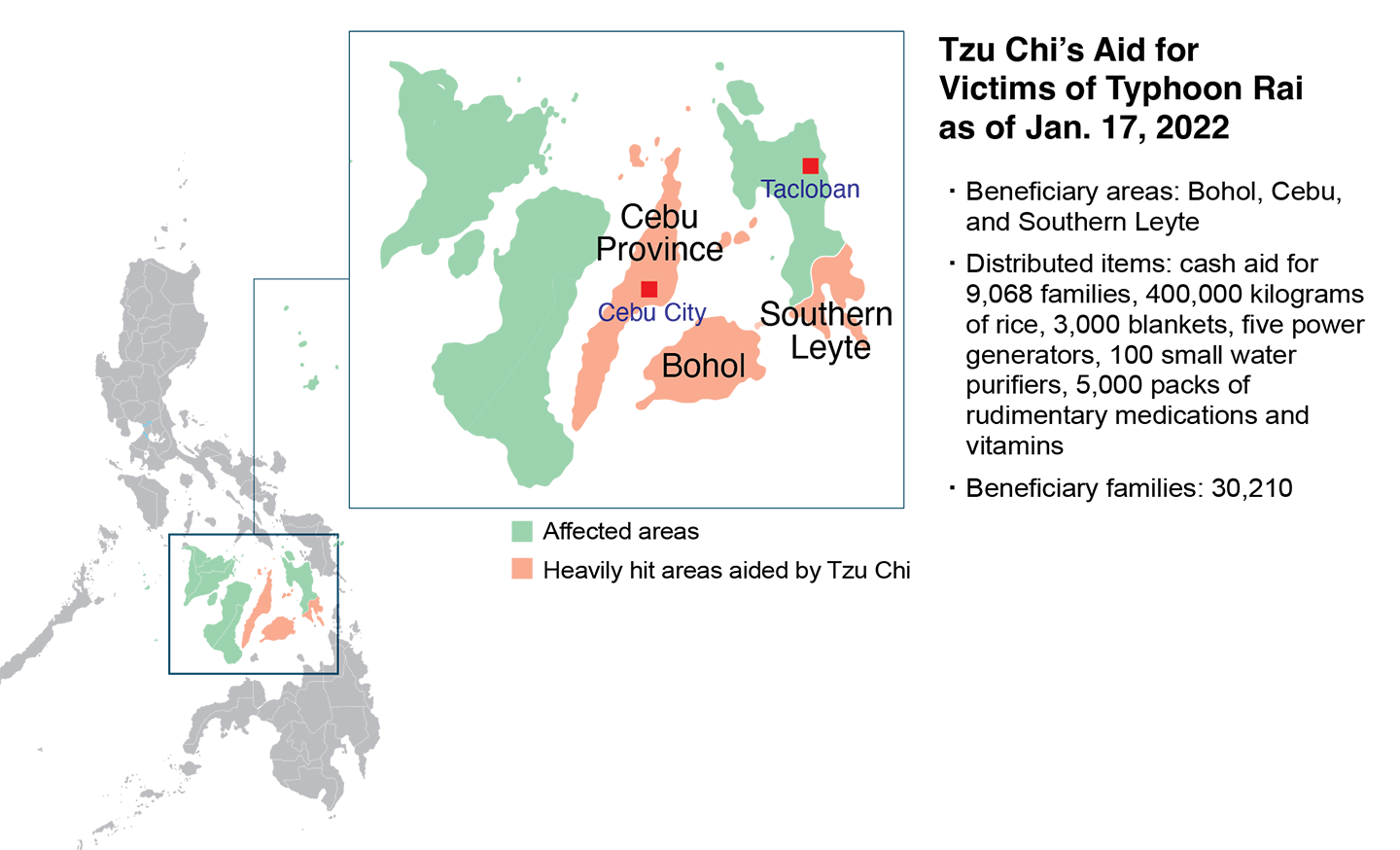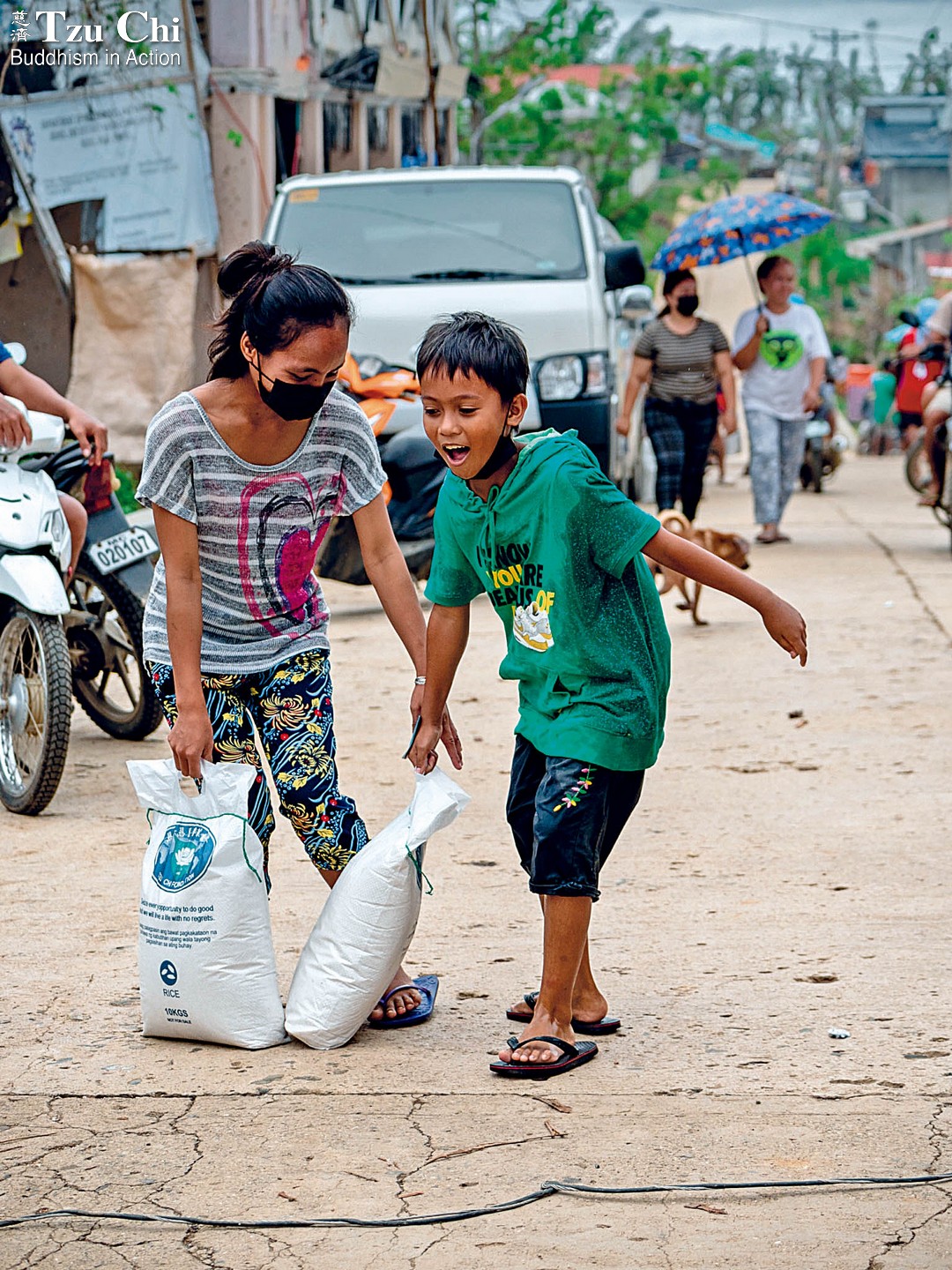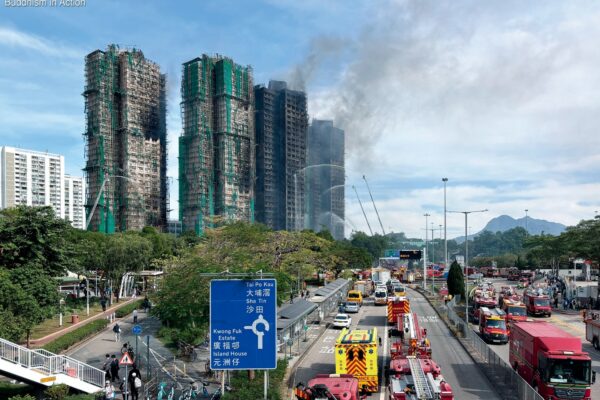Text provided by Tzu Chi Philippines
Translated by Wu Hsiao-ting
Photos by Johnny Kwok
Super Typhoon Rai ravaged central and southern Philippines in mid-December 2021. Tzu Chi volunteers swung into action immediately afterward to deliver aid and hope.

Typhoon Rai badly pummeled Bohol in the central Philippines. Its northern coastal areas, where the typhoon landed, were strewn with debris after the storm passed.
At a badly damaged school in Punta Engaño, Lapu-Lapu City, Cebu, the Philippines, more than a thousand people waiting quietly in line suddenly erupted into applause. Some even began crying tears of joy.
The outpouring of happiness and gratitude followed an announcement from a Tzu Chi volunteer regarding the amounts of financial aid the attendees would be receiving from the foundation. Each family would receive 10,000 to 20,000 pesos (US$195-390), depending on the size of the household. Normelita Nodalo said with tears coursing down her face: “I can’t believe that we’ll be receiving so much money from you! We don’t even know you and you don’t know us. For you to give us this much help is really touching!”
Reyno Igot, a polio victim, teared up too. “It’s expected to be three months before electricity is restored to the furniture store where I work,” he said. “If I didn’t bring home money, my three kids would starve.” The money from Tzu Chi would help see him through the difficulty he was facing after the severe disaster.
Typhoon Rai, known in the Philippines as Odette, hit the country on December 16, 2021, devastating seven provinces and resulting in more than 400 deaths. Over six million people were affected. It was the strongest storm to hit the country in 2021.
The Philippines is prone to typhoons. Even though alerts were issued and people evacuated before the storm struck, Rai still dealt a heavy blow to the country. It developed from a tropical depression to a super typhoon in just three days before barreling across the central and southern regions of the vast archipelago. Power outages ensued, cutting off communications in many areas.
Tzu Chi decided to focus its damage assessment trips on the severely hit provinces of Bohol, Cebu, and Southern Leyte. Volunteers witnessed heartrending scenes of devastation that the typhoon had left behind in coastal cities and towns. Strong winds and massive flooding had left villages in ruins. Disregarding COVID safety protocols, people formed long lines at water supply stations. In one disaster area in northern Bohol, a large vessel had been swept into a village. Hungry people stood by the roadside holding placards written with “I’m starving.”
Drinking water and food were in short supply in the disaster zones and the price of fuel had soared, so Tzu Chi quickly purchased 400,000 kilograms (881,848 pounds) of rice and transported it, along with other relief supplies donated by businesses and individuals, to hard-hit areas. Large-scale distributions started in early January. More than 30,000 families had benefited by mid-January 2022. The foundation also provided power generators and water purification equipment to help ensure victims had access to clean water.
With rice and cash aid distributed by Tzu Chi in hand, survivors moved forward into the new year with their hearts lighter.
Rushing in Rice and Other Supplies
People faced shortages of food and drinking water in areas devastated by Typhoon Rai after water and electricity lines were disrupted. In response, Tzu Chi purchased rice and water purifiers in Manila and, with the help of a shipping company that had waived their fees, sent the goods along with other supplies donated by kind-hearted people to Bohol, Cebu, and Southern Leyte. People in Ubay, Cebu (photo 1), unload rice for more than a thousand families.
In photo 2, survivors hold their claim checks high at a distribution venue in Cebu, overjoyed over the financial aid they will be receiving from Tzu Chi. Regular business activities had ceased during and after Typhoon Rai, disrupting people’s income streams. Survivors could go to designated banks to cash their claim checks and then could use the money for building materials or necessities to get them through the difficult time. Courtesy of Tzu Chi Philippines
By mid-January 2022, 15,000 households in Bohol had each received 20 kilograms of rice from Tzu Chi (photo 3). Distributions of financial aid followed.

Sunshine Returns to Bohol
Narrated by Joven Uy
Interviewed and compiled by Liao Zhe-min and Li Xiu-ling
Translated by Wu Hsiao-ting
Typhoon Rai wreaked havoc in Bohol, the Philippines. Facing a disaster of this magnitude, it was impossible to rely on only a few people to pull off the relief work. I want to say “thank you” again and again to my fellow volunteers in the Philippines for their help.
I am a 70-year-old third-generation Chinese, born and raised in Bohol, an island province of the Philippines. The province is composed of the island itself and over 70 minor surrounding islands. It’s a well-known tourist attraction, offering beautiful beaches, attractive diving and snorkeling activities, and the Chocolate Hills, a world-famous geological formation. More than a million tourists flock here every year, so hotels and guesthouses abound. Most of the over 1.4 million residents work in tourism related jobs.
Because Bohol relies so much on tourism, the COVID-19 pandemic severely impacted the local economy. Repeated lockdowns and forced 14-day quarantines for foreign nationals over the last two years have led to the disappearance of tourists, leaving residents nearly bereft of their livelihoods and reliant on government aid to get by. Tzu Chi has also been providing food to families who are especially poor to help them weather the pandemic.
Sadly, as if the economic toll of COVID-19 wasn’t bad enough, Typhoon Rai hit in late 2021, delivering another hard blow to Bohol.
The typhoon brought winds and rains worse than any typhoon before. Power was out within three hours, plunging Tagbilaran, my area of residence and the capital of Bohol, into darkness. Tagbilaran is located in southwestern Bohol, more than 100 kilometers (62 miles) from where Typhoon Rai was projected to land, in northern Bohol. If the wind and rain were so bad where I live, I wondered how much worse it would be in the northeast.
As soon as daylight came, I went with other volunteers to Loboc, 25 kilometers (16 miles) east of Tagbilaran. We wanted to check out the situation where overflowing rivers had caused damage. We headed north after that, discovering areas of massive devastation. When flights resumed, Yee Lock Co (許怡樂), Johnny Kwok (郭嘉獎), and other volunteers from Manila arrived in Bohol to help us carry out damage assessment and relief work. We broke into two groups for our fact-finding trips in heavily hit cities and towns on the main island of Bohol and the small islands surrounding it.
Strong winds had destroyed houses in northern coastal areas, uprooted trees, and knocked out water, electricity, and communications services. Wherever we visited, we found people in urgent need of food and potable water. The mayor of Ubay told us he was worried that if outside aid didn’t arrive promptly, people might begin to fight for food. The governor of Bohol also appealed to Tzu Chi for help, saying that Rai had wreaked unprecedented havoc in his province.
Delivering aid
Storms and typhoons are common in the Philippines, and people here have long grown used to them. Ranked warnings from 1 to 5 are issued to caution the public of incoming weather disturbances. A level 5 indicates the strongest, most dangerous storm. Typhoon Rai, packing winds up to 260 kilometers (160 miles) per hour, was the first Level 5 storm ever to have hit Bohol. Infrastructure in the disaster areas was almost completely ruined, more than a hundred people were reported dead or missing, and over 100,000 families were affected.
Many people were evacuated in advance of the storm, but when they returned, they found their homes gone. Some affected households received small amounts of food, but wondered where their next meal would come from.
The massive earthquake that hit Bohol in October 2013 was described as a “once in a hundred years” event. It was a major calamity, but economic activities continued afterwards and people still had work to do. But the one-two punch of the pandemic and typhoon were different. The pandemic had caused people to lose their incomes, and the typhoon took their homes and belongings. The faces of survivors were marked with despair. The main island of Bohol suffered a severe blow, which directly impacted the surrounding small islands, as they depended on the main island for food and other supplies.
The Tzu Chi Manila office quickly responded by purchasing rice to distribute. Many kind people donated drinking water, water purifiers, and medicine on their own initiative for Tzu Chi to transport to Cebu and Bohol. Distributions were launched after the supplies arrived at the end of 2021.
Previously, because of lockdown restrictions, volunteers from Manila were prevented from coming to Bohol. For the past two years, distributing aid to local residents to help them through the pandemic had been left to the 30 volunteers and employees on the island. They were helped as well by more than a hundred students receiving Tzu Chi’s financial assistance in the province.
Tzu Chi’s footprint and work locally can be traced to the 2013 earthquake. Volunteers from Manila arrived on the island in the immediate aftermath of that earthquake to assess damage and provide relief. I hadn’t yet joined Tzu Chi, but after observing the volunteers and witnessing how they gave without expecting anything in return, I was deeply touched and decided to join their ranks. The Tzu Chi missions began taking root in Bohol in 2014. We built prefabricated classrooms for schools devastated by the earthquake, and have been providing charitable and medical aid to local needy people ever since.
More than a hundred students from Bohol graduate from college every year with Tzu Chi’s help. Besides helping young people with school fees, we guide them in doing charity work, hoping to bring out their compassion through such work. After Typhoon Rai hit, the students receiving aid from Tzu Chi and our volunteers in Bohol pitched in to help with the relief operations. Some entered data on aid recipients or moved relief goods into warehouses. Others volunteered at the distributions held in their hometowns. Regardless of their task, their help was invaluable in delivering aid quickly to people in need.
Although we had had experience distributing aid before in Bohol, this was the first time we were giving it out on such a large scale. Help was going to more than 10,000 families. We planned out every distribution with great care and worked with the military and police to quickly deliver 20 kilograms of rice into the hands of each family. January 2022 began with rain, but sunshine returned during our distributions—sunshine in the sky and on the smiling faces of the recipients.
I want to say over and over, “Thank you all so much!” Master Cheng Yen never forgot about Bohol. Without the help and support of volunteers from outside of Bohol, we couldn’t have carried off our distributions. We have also launched distributions of cash aid for residents of heavily hit areas.
There is still a lot of work to do to help the typhoon survivors rebuild their lives, a lot of work that requires us to work together. Natural disasters have been increasing in severity. It might be difficult to resist the devastation inflicted by a major disaster, but we can at least try to soften the impact by doing what we can to help the afflicted.

A boy in President Carlos P. Garcia, a municipality in the province of Bohol, helps his mother carry home the rice distributed by Tzu Chi in the aftermath of Typhoon Rai. Courtesy of Tzu Chi Philippines



